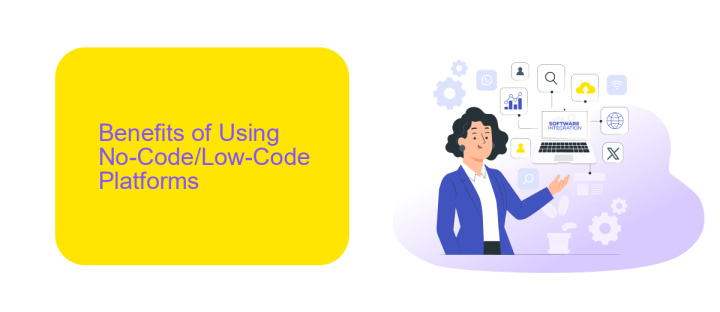No-Code Low-Code Companies
In today's rapidly evolving tech landscape, No-Code and Low-Code platforms are revolutionizing the way businesses approach software development. These innovative solutions empower companies to create robust applications without extensive programming knowledge, significantly reducing time and costs. This article explores leading No-Code and Low-Code companies, highlighting their unique offerings and the transformative impact they have on various industries.
Introduction
The rise of no-code and low-code platforms has revolutionized the way businesses develop applications and automate workflows. These platforms empower non-technical users to create complex solutions without writing a single line of code, significantly reducing development time and costs. As a result, companies of all sizes are increasingly adopting these tools to stay competitive in the fast-paced digital landscape.
- Accelerated development processes
- Cost-effective solutions
- Empowerment of non-technical staff
- Enhanced flexibility and scalability
One notable example is ApiX-Drive, a service that simplifies the integration of various applications and services. By using ApiX-Drive, businesses can easily connect their existing tools, automate data transfer, and streamline operations without the need for extensive coding knowledge. This not only enhances productivity but also allows companies to focus on their core activities, driving innovation and growth.
Benefits of Using No-Code/Low-Code Platforms

No-code and low-code platforms offer significant benefits, making software development accessible to a broader audience. One of the primary advantages is the reduction in development time. These platforms enable users to create applications quickly without needing extensive coding knowledge, which accelerates the development process and reduces time-to-market. This is especially beneficial for small businesses and startups that need to deploy solutions rapidly to stay competitive.
Another key benefit is cost efficiency. Traditional software development requires hiring skilled developers, which can be expensive. No-code/low-code platforms eliminate this need, allowing non-technical staff to build and maintain applications, thus reducing labor costs. Additionally, these platforms often come with built-in integrations, such as ApiX-Drive, which simplifies the process of connecting various services and automating workflows. This not only saves time but also ensures seamless operations across different business functions.
Challenges of Implementing No-Code/Low-Code Solutions

Implementing No-Code/Low-Code solutions can offer numerous benefits, but it also comes with its own set of challenges. One of the primary concerns is ensuring that these platforms can scale effectively to meet growing business needs. Additionally, there is often a learning curve associated with understanding and utilizing these tools to their full potential.
- Scalability Issues: No-Code/Low-Code platforms may face limitations as the complexity of the application grows.
- Security Concerns: Ensuring data security and compliance can be challenging, especially when using third-party platforms.
- Integration Challenges: Integrating with existing systems and workflows can be difficult. Using services like ApiX-Drive can help streamline and automate these integrations.
- Customization Limits: These platforms may not offer the level of customization required for specific business needs.
- Dependency on Platform: Businesses may become too reliant on a single platform, making it difficult to switch providers or tools.
Despite these challenges, many companies find that the benefits of No-Code/Low-Code solutions outweigh the drawbacks. By carefully considering these potential issues and planning accordingly, businesses can effectively leverage these platforms to enhance productivity and innovation.
Case Studies and Success Stories

No-Code and Low-Code platforms have transformed how businesses approach software development. Numerous companies have leveraged these solutions to streamline their operations and achieve remarkable success. For instance, a mid-sized retail company used a no-code platform to build an inventory management system, reducing operational costs by 30% within six months.
Another compelling example is a healthcare provider that utilized low-code tools to develop a patient management system. This innovation not only improved patient care but also increased appointment scheduling efficiency by 40%. These platforms have also been instrumental in enabling rapid prototyping, allowing startups to bring their products to market faster.
- A retail company saved 30% on operational costs with a no-code inventory system.
- A healthcare provider improved scheduling efficiency by 40% using low-code tools.
- Startups accelerated product launches through rapid prototyping.
In addition, services like ApiX-Drive have made it simpler for businesses to integrate various applications without coding knowledge. By automating workflows and data transfers, ApiX-Drive has enabled companies to enhance productivity and focus on core activities. These case studies highlight the transformative potential of no-code and low-code solutions in diverse industries.


Conclusion
In conclusion, No-Code and Low-Code platforms are revolutionizing the way businesses approach software development. These tools empower non-technical users to build, customize, and deploy applications rapidly, reducing dependency on traditional coding skills. As a result, companies can accelerate their digital transformation initiatives, improve operational efficiency, and respond more swiftly to market demands.
Moreover, the integration capabilities of these platforms, such as those offered by ApiX-Drive, further enhance their value. ApiX-Drive simplifies the process of connecting various applications and automating workflows, making it easier for businesses to streamline operations and maintain data consistency across multiple systems. As No-Code and Low-Code solutions continue to evolve, they will undoubtedly play a crucial role in shaping the future of software development and business innovation.
FAQ
What is No-Code/Low-Code development?
Who can benefit from No-Code/Low-Code platforms?
How secure are No-Code/Low-Code applications?
Can No-Code/Low-Code platforms integrate with existing systems?
What are the limitations of No-Code/Low-Code platforms?
Apix-Drive will help optimize business processes, save you from a lot of routine tasks and unnecessary costs for automation, attracting additional specialists. Try setting up a free test connection with ApiX-Drive and see for yourself. Now you have to think about where to invest the freed time and money!

